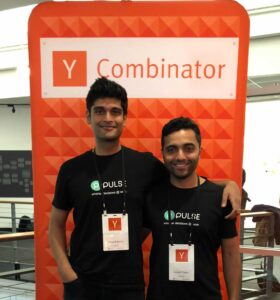My series of discussions with innovators who are building data-driven businesses continues in this interview with Mayank Mehta of Pulse. Pulse was founded in 2017 by Mayank Mehta and Anand Thaker in San Francisco. After going through the Y Combinator program in 2018 and generating substantial VC investments, the company has seen rapid growth. Their business model is based around crowdsourcing data from CIOs to facilitate better decision making and market research.

Martin: Pulse is an interesting venture that challenges some of the established vendors of B2B market data around the technology sector. Could you give a brief overview of what Pulse does and how it differs from information providers such as Gartner and IDC?
Mayank: Pulse is an online community of 24,000+ CIOs and technology executives that helps members make better business decisions based on data. To be part of this community, your title has to be at the Director or VP-level and above. Members can post and engage in discussions, polls, and surveys to share expertise, and in return they get instant insights from their peers. They also have access to a searchable and comprehensive knowledge base of industry reports relevant to their role, driven by data points from this community. The community is vendor-free and agenda-free. There are no ads and no pay-to-play in recommendations. Every product recommendation or best practice guidance is coming directly from our community members.
Martin: How many employees does the company have, where are you based?
Mayank: Pulse is based in San Francisco and we have an office in Toronto, although our entire team is working remote at the moment. We’re currently at 23 employees and growing.
Martin: What led you both to set the company up?
Mayank: Pulse co-founder Anand Thaker and I met at Cooliris, a company I co-founded prior to heading to Wharton for my MBA. Anand was the lead engineer there for our app and we worked together for a few years.
Our love for data and the idea of being able to bridge the information asymmetry across people and companies is what led us to creating Pulse. The last elections also played a major role in showing the need for a platform that enables people to learn about each other’s sentiments and intent without having to rely on traditional/broken polling.
When we looked at many companies, we saw that CIOs and executives were using a snapshot-in-time, tome-like, and very one-size-fits-all analyst reports to make their companies’ most important decisions. These cutting-edge companies were relying on lagging data generated months ago. 2020 is proof that this method no longer works — the insights of an annual report that was published in January is no longer reflective of the reality today. If you’re still using yesterday’s data for today’s world, you’re already behind.
When these broad reports were first being adopted, it was at a time where there used to be 40 companies that ruled the world. Now there’s 40,000 companies there, each with different offerings. We saw an opportunity to help execs sort through all the noise and understand what’s important by collecting relevant data on demand.
The Pulse community currently generates over 16,000 new data points weekly. Because this peer intelligence is generated in real-time in our community and our algorithm surfaces relevant topics to users, the insights are personalized, timely, and trustworthy.
We were part of the Y Combinator Winter 2018 class. We raised our first round of funding with YC (after doing a small angel round), followed by True Ventures, followed by AV8.
Martin: Your data gathering model is based around crowdsourcing information from CIOs via surveys and then sharing the insights in bite-sized segments with subscribers. How do you incentivise busy CIOs to take part?
Mayank: The truth is that we don’t really need to incentivize busy CIOs and executives. Our data is propelled forward by executives who themselves are interested in the results. We see interaction and participation happen very naturally on the platform. They are eager to share expertise with others, join discussions, and build their networks. To access the peer benchmark data, members have to participate in the survey or poll themselves. Once they do, they get access to helpful information which helps them in their own roles and makes them look good.
Once members are part of the community, they embed in a content loop – they are both part of the content generation process—answering surveys and contributing to discussions— and beneficiaries of that proces, as they gain insight into what their peers are genuinely thinking about and doing. We help out there by summarizing these data from our internal surveys into One-Minute White Papers and other digestible content.
Martin: Other technology market data providers run panels of experts to collect information. What is different about the way you do it?
Mayank: Pulse is truly built to serve as a community. These executives use Pulse to connect directly with one another and engage in honest discussions. They get guidance from peers who’ve experienced what they’ve gone through, whether it be a vendor selection, a technical decision, or an approach to company strategy, rather than relying on guidance from academics who don’t walk the hallways. Since everyone in the community is verified based on their email and LinkedIn profiles, they know the insights are trustworthy. In addition, they self-select the questions they wish to answer, meaning that we see far fewer ambivalent or ill-fitting questions and responses.
Martin: What is/are the company’s revenue model(s)?
Mayank: Pulse works with a number of customers, primarily their marketing departments, to generate surveys that help them make strategic decisions and better position their offering to customers. We anonymize the survey data and work with our customers to generate white papers and other data-based marketing assets, such as infographic-based social cards. We’ve also built out a live survey product that customers use to embed assessment surveys on their own sites for their visitors.
Martin: How are customers using data from Pulse?
Mayank: Companies use data to understand what’s important to their customers when looking at what to build or how to position their product. But data isn’t helpful to a marketing team unless it’s relevant. This data is far more valuable than any other data out there because it’s feedback straight from executives — the folks signing off on purchasing decisions. This data is also timely and fresh—it’s instant insights versus data from a study that took months to collect.
Additionally, many of our customers release analysis around the data they work with Pulse to collect (typically via press releases) to show the value of their products. This has proven exceptionally helpful in these unprecedented and unpredictable times, when executives (especially those making purchasing decisions) are under more scrutiny and pressure than ever. We’re helping put some predictability in there by helping customers understand what the clients they’re selling to are thinking, right now.
Martin: Earlier in 2020 you raised $6.5 million in a funding round. How will this be used to expand the company?
Mayank: In early 2020, we raised a $6.5 million Series A, bringing our total funding to $10.5 million. We are using the funding to expand our reach (and currently serve over 24,000 members, a huge increase from the 15,000 we had when we announced the round back in April!) as well as building our engineering and content teams.
Subsequently, we’ve rolled out two new product updates: Product IQ and Customer Communities. Product IQ is a product recommendation engine that builds live reports on larger market trends and product efficiency for customers, while Customer Communities enables marketers and customers to directly communicate in closed forums.
Martin: As a data-driven company, what would you say is Pulse’s primary competitive advantage in terms of building a defensible business model?
Mayank: Pulse’s primary competitive advantage is that our data is personalized, fast, and comes directly from our large community of verified executives. Our questions and their responses are generated by real people who rely on data to make their biggest business and purchasing decisions.

Martin De Saulles
Editor, Information Matters
Dr Martin De Saulles is a writer, analyst and lecturer specializing in the commercial applications of data.

